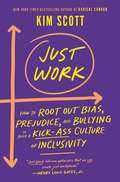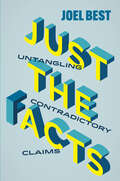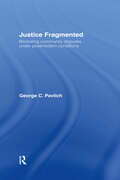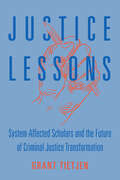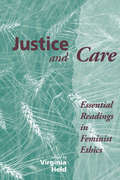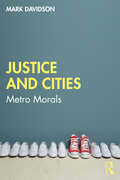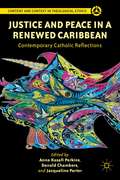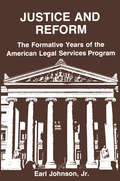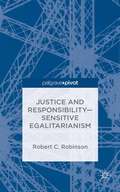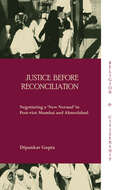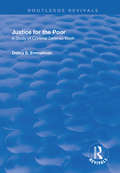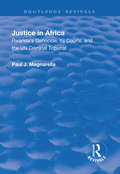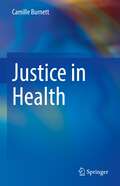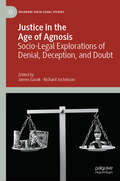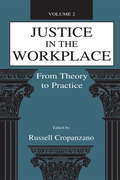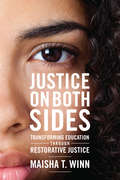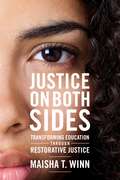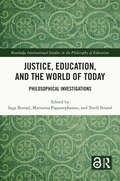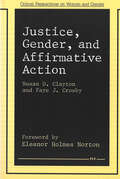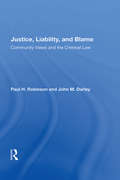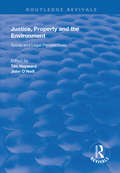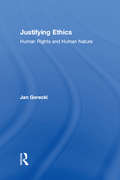- Table View
- List View
Just Work: Get Sh*t Done, Fast & Fair
by Kim ScottFrom Kim Scott, author of the revolutionary New York Times bestseller Radical Candor, comes Just Work: Get Sh*t Done, Fast & Fair—how we can recognize, attack, and eliminate workplace injustice—and transform our careers and organizations in the process.We—all of us—consistently exclude, underestimate, and underutilize huge numbers of people in the workforce even as we include, overestimate, and promote others, often beyond their level of competence. Not only is this immoral and unjust, it's bad for business. Just Work is the solution.Just Work is Kim Scott's new book, revealing a practical framework for both respecting everyone’s individuality and collaborating effectively. This is the essential guide leaders and their employees need to create more just workplaces and establish new norms of collaboration and respect.
Just the Facts: Untangling Contradictory Claims
by Joel BestWhy can’t we seem to agree on facts? In this succinct volume, sociologist Joel Best turns his inimitable eye toward the social construction of what we think is true. He evaluates how facts emerge from our social worlds—including our beliefs, values, tastes, and norms—and how they align with those worlds’ standards. He argues that by developing a sociological perspective toward what we think we know, we can better parse the use of facts and untruths around us. This book examines how facts are created and supported through science, government, law, and journalism, revealing that facts are actually claims. These claims are malleable and can change over time through fact-checking, revision, and sometimes rejection. Best guides us through these processes so that we can question our assumptions and understand why disputes happen in the first place. In a time of increasing social and political divide, Just the Facts urges us to resist defensiveness over our facts and approach disputes in critical new ways.
Justice Fragmented: Mediating Community Disputes Under Postmodern Conditions
by George C. PavlichSuppose you have a dispute with your neighbour, and wish to secure redress for losses incurred. How might the issue be resolved? Is it worth the cost and time delay to take the issue to court? Or is there some other approach? Over the past few decades a range of alternative, dispute resolution programmes have emerged to settle conflicts informally, outside the courtroom. Drawing on real life experiences of community mediation practices in British Columbia, Canada, the author explores informal justice as an event rendered possible by the fragmentation of justice under postmodern conditions. He develops some of Foucault's ideas on governmentality to erect an analytical framework that does not view community mediation as necessarily empowering, or an inevitable expansion of state control. The analysis identifies how one might engage with current versions of community justice and yet avoid the political apathy that too often accompanies such criticism.
Justice Lessons: System-Affected Scholars and the Future of Criminal Justice Transformation
by Grant E. TietjenSince the 1990s, the community of scholar-activists who have had contact with the criminal legal system has grown rapidly, solidifying into an international movement. Drawing on in-depth conversations with system-affected academics as well as his own experience with incarceration, Grant E. Tietjen traces the history, positive impacts, and future promise of this movement. By offering networks of support to system-affected people seeking higher education and using the perspectives afforded them by their lived experiences to push their disciplines forward, the movement effects reciprocal changes between the individual and the entire institution of higher education. These changes, Tietjen argues, ripple outward and stand to contribute to the wider movement against carceral responses to harm.
Justice and Care: Essential Readings in Feminist Ethics
by Virginia Held<p>When feminist philosophers first turned their attention to traditional ethical theory, its almost exclusive emphasis upon justice, rights, abstract rationality, and individual autonomy came under special criticism. Women's experiences seemed to suggest the need for a focus on care, empathetic relations, and the interdependence of persons. <p>The most influential readings of what has become an extremely lively and fruitful debate are reproduced here along with important new contributions by Alison Jaggar and Sara Ruddick. As this volume testifies, there is no agreement on the important questions about the relationship between justice and care, but the debate has deepened and enriched our understanding in many ways.Justice and Care is a valuable collection of readings—an essential tool for anyone studying the state of feminist thought in particular or ethical theory in general.</p>
Justice and Cities: Metro Morals
by Mark DavidsonThis book explores different theories of justice and explains how these connect to broader geographical questions and inform our understanding of urban problems. Since philosophers like Socrates debated in the ancient agora, cities have prompted arguments about the best ways to live together. Cities have also produced some of the most vexing moral problems, including the critical question of what obligations we have to people we neither know nor affiliate with. The first part of this book outlines the most well-developed answers to these questions: the justice theories of Utilitarianism, Libertarianism, Liberalism, Marxism, Communitarianism, Conservativism, and recent "post" critiques. Within each theory, we find a set of geographical propensities that shape the ways purveyors of the theories see the city and its moral problems. The central thesis of the book is therefore that competing moral theories have distinct geographical concerns and perspectives, and that these propensities often condition how the city and its injustices are understood. The second part of the book features three studies of contemporary urban problems – gentrification, segregation, and (un)affordability – to demonstrate how predominant justice theories generate distinctive moral and geographical interpretations. This book therefore serves as an urbanist’s guide to justice theory, written for undergraduates and postgraduates studying human geography, urban and municipal planning, urban theory and urban politics, sociology, and politics and government.
Justice and Peace in a Renewed Caribbean: Contemporary Catholic Reflections
by Anna Kasafi Perkins Donald Chambers Jacqueline PorterThis collection of critical essays and personal reflections explores the insights provided by official statements of the Roman Catholic Bishops of the Caribbean. In so doing, it presents a critical reading of the corpus with a view to presenting its relevance to the regional and global conversation on matters of human flourishing.
Justice and Reform: Formative Years of the American Legal Service Programme
by Earl JohnsonThis is the first study of the origins, philosophy, creation, management, and impact of the American Legal Services Bureau. As such, it clearly and concisely describes the program’s role as a strategy for overcoming poverty. Timely, iifiportant, and unique, Justice and Reform provides the background and a comprehensive study of an endeavor that has been called both the most successful element of the war on poverty and the most stimulating development to occur in the American legal profession during the twentieth century.
Justice and Responsibility— Sensitive Egalitarianism
by Robert C. RobinsonThis text explores the place to locate the cut between those inequalities for which it is fair to hold one responsible, and those for which it is not. The argument traces a thread of intellectual history, identifying a rejection of strong property rights which we inherit from Locke, and find in contemporary defenders of entitlements such as Nozick.
Justice at Work: The Rise of Economic and Racial Justice Coalitions in Cities
by Marc Doussard Greg SchrockA pathbreaking look at how progressive policy change for economic justice has swept U.S. cities In the 2010s cities and counties across the United States witnessed long-overdue change as they engaged more than ever before with questions of social, economic, and racial justice. After decades of urban economic restructuring that intensified class divides and institutional and systemic racism, dozens of local governments countered the conventional wisdom that cities couldn&’t address inequality—enacting progressive labor market policies, from $15 minimum wages to paid sick leave.Justice at Work examines the mutually reinforcing roles of economic and racial justice organizing and policy entrepreneurship in building power and support for policy changes. Bridging urban social movement and urban politics studies, it demonstrates how economic and racial justice coalitions are collectively the critical institution underpinning progressive change. It also shows that urban policy change is driven by &“urban policy entrepreneurs&” who use public space and the intangible resources of the city to open &“agenda windows&” for progressive policy proposals incubated through national networks. Through case studies of organizing and policy change efforts in cities including Chicago, Seattle, and New Orleans around minimum wages, targeted hiring, paid time off, fair scheduling, and anti-austerity, Marc Doussard and Greg Schrock show that the contemporary wave of successful progressive organizing efforts is likely to endure. Yet they caution that success is dependent on skillful organizing that builds and sustains power at the grassroots—and skillful policy work inside City Hall. By promoting justice at—and increasingly beyond—work, these movements hold the potential to unlock a new model for inclusive economic development in cities.
Justice at a Distance
by Loren E. LomaskyThe current global-justice literature starts from the premise that world poverty is the result of structural injustice mostly attributable to past and present actions of governments and citizens of rich countries. As a result, that literature recommends vast coercive transfers of wealth from rich to poor societies, alongside stronger national and international governance. Justice at a Distance, in contrast, argues that global injustice is largely home-grown and that these native restrictions to freedom lie at the root of poverty and stagnation. The book is the first philosophical work to emphasize free markets in goods, services, and labor as an ethical imperative that allows people to pursue their projects and as the one institutional arrangement capable of alleviating poverty. Supported by a robust economic literature, Justice at a Distance applies the principle of noninterference to the issues of wealth and poverty, immigration, trade, the status of nation-states, war, and aid.
Justice before Reconciliation: Negotiating a ‘New Normal’ in Post-riot Mumbai and Ahmedabad (Religion and Citizenship)
by Dipankar GuptaThe book explores how Muslims in Mumbai and Ahmedabad coped with the aftermath of the violence directed against them in 1993 and 2002 respectively, and how they responded to the ethnic carnages of which they were the victims, highlighting the importance of the context and the history of the place where such violence occurred. Unlike other studies on ethnic violence which have a short-term focus, in dealing with its immediate aftermath, this book examines what happens to the victims over time and how they negotiate a ‘new normal’ and get on with their lives. Using empirical material based on field work in Mumbai and Ahmedabad, the book shows that while poverty, education and employment remain important elements in the recovery process, the most crucial issue is that of justice and the need to reclaim citizenship. A significant section of the book is devoted to the relationship between Muslim faith-based organisations and the victims of ethnic violence.
Justice for the Poor: A Study of Criminal Defence Work
by Debra S. EmmelmanThis title was first published in 2003. In this study, the author examines the behavior of one group of court-appointed defence attorneys and reaches the conclusion that although, in contrast to popular opinion, these attorneys maintain an adversarial stance against the prosecutors and behave in a legally ethical (or "procedurally just") manner, case outcomes are unduly shaped by social class and are therefore substantively unjust. This occurs because poor defendants typically lack cultural rhetoric that favourably influences those who construct and operate the criminal court system. Ironically, this indicates that, in many cases, the process of plea bargaining may be more substantively just than trials. A major contribution of the study is the detailed analysis of the manner by which oppression and substantive injustice occur in the adjudication of many cases and how the cultural practices of the powerful can frequently misconstrue, exclude and mute the voices of the poor.
Justice in Africa: Rwanda's Genocide, Its Courts and the UN Criminal Tribunal (Routledge Revivals)
by Paul J MagnarellaThis title was first published in 2000: This work describes the United Nations International Criminal Tribunal for Rwanda (ICTR) - the first international court created to try persons for genocide and violation the humanitarian law of non-international armed conflict. The book begins with an explanation of the causes of the 1994 genocide in Rwanda. It then discusses the UN Security Council's creation of the ICTR and the Tribunal's organization, functioning, accomplishments and shortcomings. The author explains how the Tribunal has gained custody over suspects who had fled to other countries in Africa, Europe and also to the USA. The book analyzes the ICTR's first several cases and describes the unique contributions the Tribunal is making to the expansion of humanitarian law. In addition, the author describes Rwanda's own legal attempts to deal with the trauma of 1994 by passing a new genocide statute and creating special genocide courts. He also explains the similiarities and differences between the Tribunal for Rwanda and the one created by the UN Security Council to deal with major crimes committed during the break-up of former Yugoslavia.
Justice in Health
by Camille BurnettInequities and health disparities are the greatest and most pressing social issues of our time. This book explores public health practice through the critical lens of social and structural justice by examining our approach to health and what it means to be healthy, systemically and structurally.Through recent events, the raw reality of health disparities and inequities have been exposed. These events are earmarked by COVID-19's decimating and disparate impacts on Black and Brown populations during one of the greatest social movements of our time to end racism. Since this very public explosion of intersecting forms of oppression and inequitable suffrage, many have clamored to make sense of it, to reframe our narratives toward action, and re-envision what progress and change could look like. This text is positioned as a tool to help professionals dismantle old ways of thinking while reconstructing new ones that can be more responsive in meeting the realities of today.The author challenges the reader to think about public health more deeply and pragmatically as the space for reconciling solutions to these poignant health issues. This requires the exploration of an ideological shift in how we think of health, how we prepare healthcare providers outside of an antiquated sick care system, and how we prioritize the determinants of health across a re-imagined continuum of care. The scope of this book ranges from a historical and structural examination of our beliefs about health to perceiving a more just system of care where health is intentionally co-created toward this aim. It intentionally explores health along the lines of equity and through the broader lens of the social determinants of health to shed light on the opportunity in this moment that public health creates for health care.Justice in Health is a timely and important resource for healthcare professionals (pre- and post-licensure) and healthcare decision-makers. The book also appeals more widely to instructors, academics, researchers, and students across disciplines of nursing, medicine, public heath, sociology, and social work.
Justice in the Age of Agnosis: Socio-Legal Explorations of Denial, Deception, and Doubt (Palgrave Socio-Legal Studies)
by Richard Jochelson James GacekThis book seeks to further the understanding of the human experience of coerced and forced ignorance on social, human rights and criminal justice related topics, drawing together scholars from multiple, disciplinary fronts. It argues that people in our social world are forced or coerced through either implicatory or interpretive denial that is normalized through specific cultural and social mechanisms by which we refer to this as non-knowledge or agnosis. There has also been a lack of scholarship which examines how human victimization and power intersects by and through the systematic orchestration of forced ignorance and doubt upon daily human life. This book's focus is an examination of the ways in which people find themselves in social spaces without empirical clarity and understand that absence as satisfaction, stability, or perhaps even pleasure. It discusses a range of topics, including for example people's sense of relative safety, despite empirical realities suggesting otherwise. This book seeks to make visible the role of ignorance in governing society, highlighting how the late modern human experience in a post-World War II human rights era subsumes, subverts, and sublimates the complex relationship between knowledge and denial; the empirical gulf between knowledge and resistance may indeed breed complicit bliss.
Justice in the Workplace: From theory To Practice, Volume 2 (Applied Psychology Series)
by Russell CropanzanoJustice in the Workplace acts as a central reference point for application of organizational justice and helps human resource managers relate the importance of justice to their work environments. Forming much of this book's content, outcomes, processes, and interpersonal treatment are three powerful tools for building and maintaining workplace justice. In Part I these books are discussed at a theoretical level. Part II applies these theories to several issues important to both human resource management and society. And Part III looks at organizational justice in the years ahead. Compared to the first volume, this book will appeal to practitioners and researchers in such applied areas as human resource management, industrial organizational psychology, and management.
Justice on Both Sides: Transforming Education Through Restorative Justice (Race and Education)
by Maisha T. WinnRestorative justice represents &“a paradigm shift in the way Americans conceptualize and administer punishment,&” says author Maisha T. Winn, from a focus on crime to a focus on harm, including the needs of both those who were harmed and those who caused it. Her book, Justice on Both Sides, provides an urgently needed, comprehensive account of the value of restorative justice and how contemporary schools can implement effective practices to address inequalities associated with race, class, and gender. Winn, a restorative justice practitioner and scholar, draws on her extensive experience as a coach to school leaders and teachers to show how indispensable restorative justice is in understanding and addressing the educational needs of students, particularly disadvantaged youth. Justice on Both Sides makes a major contribution by demonstrating how this actually works in schools and how it can be integrated into a range of educational settings. It also emphasizes how language and labeling must be addressed in any fruitful restorative effort. Ultimately, Winn makes the case for restorative justice as a crucial answer, at least in part, to the unequal practices and opportunities in American schools.
Justice on Both Sides: Transforming Education through Restorative Justice (Race and Education)
by Maisha T. WinnRestorative justice represents “a paradigm shift in the way Americans conceptualize and administer punishment,” says author Maisha T. Winn, from a focus on crime to a focus on harm, including the needs of both those who were harmed and those who caused it. Her book, Justice on Both Sides, provides an urgently needed, comprehensive account of the value of restorative justice and how contemporary schools can implement effective practices to address inequalities associated with race, class, and gender. <p><p> Winn, a restorative justice practitioner and scholar, draws on her extensive experience as a coach to school leaders and teachers to show how indispensable restorative justice is in understanding and addressing the educational needs of students, particularly disadvantaged youth. Justice on Both Sides makes a major contribution by demonstrating how this actually works in schools and how it can be integrated into a range of educational settings. It also emphasizes how language and labeling must be addressed in any fruitful restorative effort. Ultimately, Winn makes the case for restorative justice as a crucial answer, at least in part, to the unequal practices and opportunities in American schools.
Justice, Education, and the World of Today: Philosophical Investigations (Routledge International Studies in the Philosophy of Education)
by Marianna Papastephanou Torill Strand Inga BostadThis edited book challenges the limits of current educational philosophical discourse and argues for a restored normativisation of education through a powerful notion of justice. Moving beyond conventional paradigms of how justice and education relate, the book rethinks the promotion of justice in, for, and through education in its current state. Chapters combine international and diverse philosophical perspectives with a focus on contemporary issues such as climate change, the COVID-19 pandemic, racism, and migrant crises. Divided into three distinct parts, the book explores the ontological and socio-political grounds underlying our notions of education and justice, and offers self-reflective meta-critique on education philosophers’ tendency of promoting and upholding orthodox visions and missions. Ultimately, the book offers contemporary and innovative philosophical reflections on the link between justice and education, and enriches the discourse through a multi-perspectival and sensitive exploration of the topic. It will be of great interest to scholars, researchers, and postgraduate students in the fields of philosophy of education, education policy and politics, education studies and social justice.
Justice, Education, and the World of Today: Philosophical Investigations (Routledge International Studies in the Philosophy of Education)
by Marianna Papastephanou Torill Strand Inga BostadThis edited book challenges the limits of current educational philosophical discourse and argues for a restored normativisation of education through a powerful notion of justice.Moving beyond conventional paradigms of how justice and education relate, the book rethinks the promotion of justice in, for, and through education in its current state. Chapters combine international and diverse philosophical perspectives with a focus on contemporary issues, such as climate change, the COVID-19 pandemic, racism, and migrant crises. Divided into three distinct parts, the book explores the ontological and socio-political grounds underlying our notions of education and justice, and offers self-reflective meta-critique on education philosophers’ tendency of promoting and upholding orthodox visions and missions. Ultimately, the book offers contemporary and innovative philosophical reflections on the link between justice and education, and enriches the discourse through a multi-perspectival and sensitive exploration of the topic. It will be of great interest to scholars, researchers, and postgraduate students in the fields of philosophy of education, education policy and politics, education studies, and social justice.The Open Access version of this book, available at www.taylorfrancis.com, has been made available under a Creative Commons Attribution-Non Commercial-No Derivatives 4.0 license. Funded by University of Oslo.
Justice, Gender, and Affirmative Action (Critical Perspectives On Women And Gender)
by Faye J. Crosby Susan D. ClaytonJustice, Gender, and Affirmative Action by Susan D. Clayton and Faye J. Crosby offers a deep dive into the complex debates surrounding affirmative action through the lens of gender and social psychology. Addressing the persistent gender disparities in the workplace, the authors argue for the necessity of affirmative action to combat ingrained biases and structural inequalities that permeate both economic and sociological dimensions. They use the theory of relative deprivation to illustrate how societal injustices can be overlooked by both victims and society, underscoring the importance of proactive measures like affirmative action. The book analyzes various judicial precedents shaping the discourse and application of affirmative action, highlighting their impact on women's progress, particularly white women, who have benefited significantly from these programs. With insights drawn from numerous studies, the authors argue that affirmative action is essential and propose strategies for its effective implementation, emphasizing that these policies should address systemic biases rather than attempt to compensate for perceived deficiencies within marginalized groups. Through a meticulous examination of the controversies and criticisms of affirmative action, Clayton and Crosby guide readers towards a nuanced understanding of its necessity in promoting justice and equity in contemporary society.
Justice, Liability, And Blame: Community Views And The Criminal Law
by Paul H. RobinsonThis book examines shared intuitive notions of justice among laypersons and compares the discovered principles to those instantiated in American criminal codes. It reports eighteen original studies on a wide range of issues that are central to criminal law formulation.
Justice, Property and the Environment: Social and Legal Perspectives (Routledge Revivals)
by John O'Neill Tim HaywardFirst published in 1997, this book discusses the interplaying factors environmental issues have on justice and property and other social problems. Endeavouring create a discourse on what sustainability means in implementation, each of the contributors to this book approaches this via different theoretical viewpoints.
Justifying Ethics: Human Rights and Human Nature
by Jan Gorecki"Human rights include individual rights against government oppression, such as the right to freedom of thought, religion, speech, assembly, and to a fair system of criminal justice. But even in this basic political sense, ""human rights"" means different things in different historical and cultural contexts and advocacy of such rights has frequently been viewed as subjective. Justifying Ethics offers a thorough critique of the most common attempts to formulate objective standards through appeals to human nature, religion, and reason. Gorecki opens his inquiry by considering the role of norm-making concepts in the history of ethical thought: how standards of rights were claimed to conform to human nature and reason or have been stipulated by an external authoritative source such as God or social contracts. He then shows how such justifications may be discounted on analytical or practical grounds using such examples as divine will, Kantian reason, and the truth value of moral judgments. With respect to empirically grounded appeals to human nature, Gorecki argues against the notion that the innate plasticity of human behavior and potential for social diversity is sufficient grounds for human rights activity without objective justification. The search for justification remains essential in enhancing the persuasiveness of ethical action that aims at the moral ""contagion"" of the people by the human rights experience and the transition from moral acceptance to legal implementation.Broad in intellectual scope, Justifying Ethics draws upon moral and political philosophy, social policy, psychology, history, jurisprudence, and international law to clarify the prerequisites for the success of human rights activity. The book will be of special interest to political theorists, philosophers, sociologists, and human rights activists."
